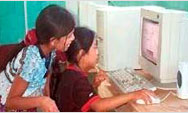 |
 |
|
 |
 |
|
 |
 |
 |
USAID Information:
External Links:
|
|
 |
 |
|
 |
 |
|
El Salvador


Please note: All linked documents are in PDF format
| Objective |
SO Number |
FY 2004 |
FY 2005 |
FY 2006 |
| Economic Growth, Agriculture and Education |
519-001 |
2,534 |
|
|
| Democratic Consolidation and Governance |
519-002 |
4,355 |
|
|
| Health of Women and Children |
519-003 |
7,150 |
|
|
| Clean Water Access |
519-004 |
3,600 |
|
|
| Ruling Justly |
519-021 |
1,000 |
4,350 |
4,061 |
| Economic Freedom |
519-022 |
15,666 |
18,589 |
11,228 |
| Investing in People |
519-023 |
|
11,626 |
10,065 |
| P.L. 480 Title II |
|
630 |
|
|
| Total (in thousands of dollars) |
34,935 |
34,565 |
25,354 |
|
The Development Challenge: In the span of 13 years, El Salvador has implemented reforms from the Peace Accords that ended a long civil war; endured a devastating hurricane and two powerful earthquakes; and suffered the combined impacts of declining coffee prices, loss of apparel industry jobs, and high petroleum prices. In the face of these problems, El Salvador continues to make substantial progress along a path of transformational political, economic and social development. While much of Latin America has experienced negative growth rates during this decade, the Salvadoran economy has maintained a positive average annual growth rate of slightly below 2%. In March 2004, the country held presidential elections deemed transparent, free and fair, with a voter turnout of 67%. The newly-elected government faces the daunting task of delivering on its promises of economic and social reform.
Economic growth projections for 2005 are expected to be about 2.5%, given several factors. In 2004 the inflation rate, while modest by international standards, more than doubled to 5.3%, due to the high price of petroleum. In addition, 10,000 apparel industry jobs were lost as a result of new competition from China. Broad-based growth continues to be a challenge, with highly unequal income distribution, where the poorest 20% of the population receive only 3.1% of the nation's income. This translates to more than one million people who do not earn enough to take care of their families' basic needs. Remittances from Salvadorans in the United States are expected to reach $2.5 billion in 2004.
To contend with the social and economic issues that could hamper the country's progress, the Government of El Salvador (GOES) plans to increase social investments in rural regions where poverty rates are the highest in order to improve the quality of education and health care delivery. To increase social investment, the GOES recognizes that it must push ahead with implementation of key fiscal reforms that will stimulate increased tax collection. Other items on the GOES agenda include security, transparent and responsible governance, economic competitiveness, and increased job creation and economic opportunities through trade and micro, small and medium enterprises. It is an integrated agenda with each part affecting another.
El Salvador's strategic location and strong ties to the United States make its political and economic stability a vital U.S. interest. The political and economic liberalization encouraged by the United States and adopted by El Salvador has made the country a model for post-conflict developing countries. The United States is El Salvador's most important trading partner, receiving 64.4% of exports and providing 46.7% of imports. Approximately two million Salvadorans reside in the United States, many of them illegally. By promoting prosperity in El Salvador through USAID programs and opportunities such as the Central America Free Trade Agreement (CAFTA), the United States can help strengthen the economy, thereby reducing the flow of economic migrants to the United States and reducing U.S. vulnerability to transshipment of narcotics and trafficking in persons.
The USAID Program: In FY 2005 USAID will complete four programs under its 1997-2004 strategy that focus on economic opportunities for rural poor families, democracy and good governance, health of rural Salvadorans, and rural household access to clean water. USAID will also finish its earthquake recovery program, having contributed to the reconstruction of rural housing, health and education facilities, water systems and reactivation of the most affected sectors of the rural economy. USAID will begin implementation, under the Central America and Mexico (CAM) Regional Strategy, of a new El Salvador Country Plan. Under this strategy, USAID will implement programs under three objectives consistent with Millennium Challenge Account objectives: Ruling Justly, Economic Freedom, and Investing in People. USAID will begin its new Investing in People program and continue implementing activities under the Economic Freedom and Ruling Justly programs.
Other Program Elements: In addition to the bilateral program, there are ongoing activities in El Salvador managed by regional programs. Under the Central America Regional Program (G-CAP), the Rural Diversification Program supports small and medium-scale specialty coffee producers by enhancing quality, introducing better practices, improving market differentiation and certification, and increasing value-added components. The G-CAP Trade program supports trade competitiveness and readiness to participate in sub-regional, hemispheric and global markets and promotes effective preparations for trade negotiations. USAID's Latin American and Caribbean (LAC) Bureau supports efforts in civil society outreach to explain the objectives and benefits of CAFTA. The G-CAP Environmental program supports El Salvador in the area of cleaner industrial production processes related to proposed CAFTA requirements and environmental conservation of the Gulf of Fonseca. G-CAP's Regional HIV/AIDS activities support effective behavior change among at-risk groups.
Through its farmer-to-farmer program, USAID's Economic Growth, Agriculture, & Trade (EGAT) Bureau supports volunteer technical assistance to promote horticulture and dairy production and marketing. USAID's EGAT Bureau also funds a small grants program benefiting migratory birds and their winter habitats in El Salvador. Through USAID's Centers of Excellence for Teacher Training Program, training and technical assistance was provided to 93 teachers in 74 schools. USAID's Civic Educational for Reform in Central America program assisted the development of case studies on citizens' contribution for improving quality education and on the development of a School Report Card model in selected rural schools.
Other Donors: Donor coordination in El Salvador reinforces policy dialogue and enhances communication and coordination. With the active participation of the donor community, the United Nations Development Program (UNDP) is leading the development of improved coordination mechanisms among donors and with the Government. Sectoral working groups formed by the GOES, donors, and civil society representatives discuss key topics of national interest. USAID actively participates in a number of these groups.
In 2004 bilateral support to El Salvador totaled $74.3 million. The United States continued to be the largest bilateral donor. Other major bilateral donors include Germany, Japan (economic reactivation and job creation; social development; environmental conservation; and democratic consolidation), Spain (poverty reduction; environment; human investment; infrastructure and economic promotion; institutional strengthening; good governance; and conflict prevention), and Sweden (housing construction).
Multilateral assistance in 2004 totaled $34.2 million. Major multilateral agencies are the UNDP (rule of law; environment; local health services provision; gender programs; and civil society without violence), European Union (micro and small enterprises), Inter-American Institute for Cooperation on Agriculture, and the Pan American Health Organization. UNDP is also helping the GLOES implement the $23.5 million Global Fund for AIDS, Tuberculosis and Malaria program.
Back to Top ^
|


